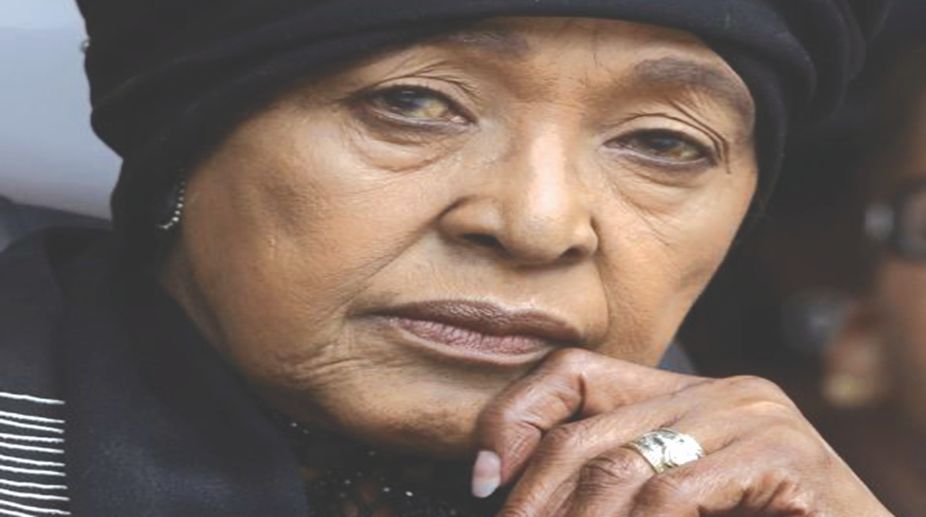‘They have turned Soweto into a Disneyland for Mandela. They have tried to make Madiba like Elvis Presley; it has become a tourist site. Now with the death, so many foreigners will be going there, then they will say they have seen the real South Africa, Winnie will be there of course, showing off how close she is to the poor of this country.”
The derision came from Andile Bongami, who was speaking to me two days after the death of Nelson Mandela at another, lesser-known South African township, Tembisa.
Advertisement
The 62-year-old carpenter was standing outside his home, in an area known as “Winnie Mandela’s Shacks”, which had been taken over, he pointed out, with the encouragement of the former first lady. The extensive development projects she had promised were yet to arrive.
Bongami’s neighbours in Tembisa – Zulu for “there is hope” – turned up at his home, a room with peeling plaster with a floor of beaten earth and intermittent water and electricity supply, to complain about the grinding poverty of their lives and greedy and corrupt politicians who had let them down.
Much of their discontent was directed at Winnie, who had become rich and powerful, they complained, and who had neglected them. “We don’t see her, she has been a big disappointment, we really do not like her now,” commented Lucas Sibisi, one of the residents who was once one of her fervent supporters.
But Winnie Madikizela-Mandela, her full official surname, who died on Monday at the age of 81, four years after her former husband, continued to be known as “The Mother of the Nation”.
This was despite her divorce from Nelson, despite convictions for kidnapping and fraud and allegations of other crimes from corruption to instigating murder and unseemly property disputes following the death of Nelson Mandela, the nation’s beloved Madiba.
Like Robert Mugabe in neighbouring Zimbabwe, who was removed from power last November after 37 years, the latter-day sins of the leaders of the independence struggle are forgiven to an extent because of the courage, suffering and sacrifice of the past. Comrade Bob’s wife Grace has not been given such dispensation: her progress to the top echelons of Zimbabwe’s kleptocracy is seen as purely due to her marriage.
While Nelson Mandela was serving his sentence in Robben Island, Winnie began to take a leading role in the African National Congress (ANC) and paid the price. Over the years she was arrested, kept in solitary confinement in a 5ft by 10 ft concrete cell and viciously treated during interrogation. After her release she was harassed, banned and banished by the apartheid government. These things are not easily forgotten or ignored.
On returning to Soweto in 1985 after another banishment, Winnie Madikizela-Mandela proclaimed: “We have no guns, we have only stones, boxes of matches and patrol. Together, hand in hand, with our boxes of matches and our necklaces, we shall liberate the country.”
What followed was “necklacing” – forcing a petrol-soaked tyre over someone and then setting it on fire. The horrific killings caused huge international outcry, especially in the West. But to her supporters and many others it was justified retribution against informers of a brutal police state, or criminals who had been preying on the community.
The list of victims grew with members of the Mandela United Football Club, which she had founded, carrying out attacks. Winnie was accused of instigating and even taking part in the murder of 14-year-old James “Stompie” Moeketsi Seipai.
Nelson Mandela’s wife was charged in connection with Stompie’s murder, convicted of kidnapping and being accessory to assault despite witnesses disappearing. On appeal her assault conviction was overturned, but the kidnapping one was upheld. She paid a fine of R15,000 (about £3,000 at the time).
Winnie survived, however, and prospered within the ANC, heading the party’s Women’s League and running for deputy president. But controversy was never far away – she had to resign from her posts after being convicted of fraud in 2003.
But her popularity rose again later and the ANC declared that it would always stand by Winnie. Cyril Ramaphosa, who has taken over as president from the discredited Jacob Zuma, said at her home in Soweto on Monday night: “The people are grieving very deeply. The death is a great loss on that she has been one of the strongest women in our struggle who suffered immensely. She remained courageous on behalf of the people.”
Winnie Madikizela-Mandela will be given a state funeral (on 14 April) and thousands are expected to attend. Lucas Sibisi from Tembisa township, one of those who had become so disillusioned with her, will be among the mourners, he told me when I contacted him for his reaction to the death.
“She did a lot of things wrong, that is plain to see. But you know, despite all that is wrong with our country, we are no longer ruled by the apartheid racists, people sometime forget that,” Sibisi said.
“That is why we loved Nelson Mandela, Madiba. We don’t love Winnie, but she played her part, and she suffered for it. So yes, we are going to go and pay our respect, that is the right thing to do.”
The Independent.











